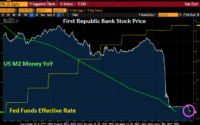Reporting by Richard Rohan Francis, Davide Barbuscia, Andrea Shalal, David Morgan, Saeed Azhar and Caroline Valetkevitch; writing by Ira Iosebashvili; Editing by Megan Davies, Shilpi Majumdar, Shounak Dasgupta, David Gregorio, Chris Reese, Diane Craft and Christian Schmollinger
Moody’s turns negative on US credit rating, draws Washington ire
NEW YORK/WASHINGTON, Nov 10 (Reuters) – Moody’s on Friday lowered its outlook on the U.S. credit rating to “negative” from “stable” citing large fiscal deficits and a decline in debt affordability, a move that drew immediate criticism from President Joe Biden’s administration.
The move follows a rating downgrade of the sovereign by another ratings agency, Fitch, this year, which came after months of political brinkmanship around the U.S. debt ceiling.
Federal spending and political polarization have been a rising concern for investors, contributing to a selloff that took U.S. government bond prices to their lowest levels in 16 years.
“It is hard to disagree with the rationale, with no reasonable expectation for fiscal consolidation any time soon,” said Christopher Hodge, chief economist for the U.S. at Natixis. “Deficits will remain large … and as interest costs take up a larger share of the budget, the debt burden will continue to grow.”
The ratings agency said in a statement that “continued political polarization” in Congress raises the risk that lawmakers will not be able to reach consensus on a fiscal plan to slow the decline in debt affordability.”
“Any type of significant policy response that we might be able to see to this declining fiscal strength probably wouldn’t happen until 2025 because of the reality of the political calendar next year,” William Foster, a senior vice president at Moody’s, told Reuters in an interview.
Republicans, who control the U.S. House of Representatives, expect to release a stopgap spending measure on Saturday aimed at averting a partial government shutdown by keeping federal agencies open when current funding expires next Friday.
Moody’s is the last of the three major rating agencies to maintain a top rating for the U.S. government. Fitch changed its rating from triple-A to AA+ in August, joining S&P which has had an AA+ rating since 2011.
While it changed its outlook, indicating a downgrade is possible over the medium term, Moody’s affirmed its long-term issuer and senior unsecured ratings at ‘Aaa’ citing U.S. credit and economic strengths.
Immediately after the Moody’s release, White House spokesperson Karine Jean-Pierre said the change was “yet another consequence of congressional Republican extremism and dysfunction.”
“While the statement by Moody’s maintains the United States’ Aaa rating, we disagree with the shift to a negative outlook. The American economy remains strong, and Treasury securities are the world’s preeminent safe and liquid asset,” Deputy Treasury Secretary Wally Adeyemo said in a statement.
Adeyemo said the Biden administration had demonstrated its commitment to fiscal sustainability, including through over $1 trillion in deficit reduction measures included in a June agreement struck with Congress on raising the U.S. debt limit, and Biden’s proposal to reduce the deficit by nearly $2.5 trillion over the next decade.
Treasury yields have soared this year on expectations the Federal Reserve will keep monetary policy tight, as well as on U.S.-focused fiscal concerns.
The sharp rise in Treasury yields “has increased pre-existing pressure on US debt affordability,” Moody’s said.
A Moody’s downgrade could exacerbate fiscal concerns, but investors have said they are skeptical it would have a material impact on the U.S. bond market, seen as a safe haven because of its depth and liquidity.
However, “it is a reminder that the clock is ticking and the markets are moving closer and closer to understanding that we could go into another period of drama that could lead ultimately to the government shutting down,” said Quincy Krosby, chief global strategist at LPL Financial.
Moody’s decision also comes as Biden, who is seeking reelection in 2024, has seen his support fall sharply in the polls. A New York Times/Siena poll released on Sunday showed him trailing former President Donald Trump, the leading Republican candidate, in five of six battleground states: Nevada, Georgia, Arizona, Michigan and Pennsylvania. Biden was ahead of Trump in Wisconsin. The outcome in those six states will help determine who wins the presidential election.
The Moody’s move will also heap pressure on congressional Republicans to advance funding legislation to avert a partial government shutdown.
U.S. House Speaker Mike Johnson, who has spent days in talks with members of his slim 221-212 Republican majority about several stopgap measures, said Moody’s decision underscored the failure of what he called Biden’s “reckless spending agenda.”
“Our $33.6 trillion debt is unsustainable and poses a danger to our national security and economy,” he said in a statement. “We will fight to get our finances in order.”
The House and the Democratic-led Senate must agree on a vehicle that Biden can sign into law before current funding expires on Nov. 17.
Infighting among House Republicans has led to flirtations with government shutdowns yet both parties have contributed to budget deficits.
Biden’s Democrats have backed a wide range of spending plans, while Republicans pushed through sharp tax cuts early in Donald Trump’s presidency that also fed the deficit. The total gross U.S. debt rose by about $7.9 trillion during Trump’s years in office. Neither party has seriously addressed the rising costs of the Social Security and Medicare programs that represent a significant slice of federal spending.
Our Standards: The Thomson Reuters Trust Principles.
[ad_2]
Source link


